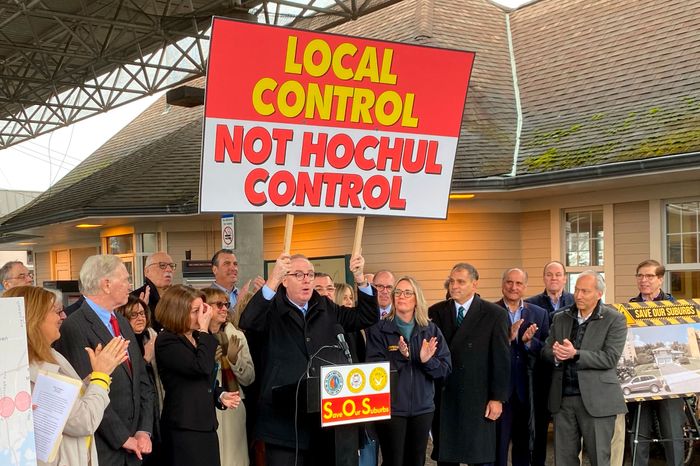
Long Island NIMBYs, rejoice! As state budget talks drag on, NY1’s Zack Fink reports that Governor Kathy Hochul is dropping the density mandates in her Housing Compact — including a provision to give the state the authority to bypass local zoning codes if towns failed to play ball. Hochul’s office hasn’t explicitly said that the mandates won’t be a part of the final deal, but things seemed to be crumbling around her plan to increase housing stock across the state.
Suburban lawmakers, in particular, have been losing their minds over the idea of having to increase their housing capacity by 3 percent every three years. (Upstate towns would face lower targets.) The idea of a few apartment buildings around LIRR stations has been too much to bear, it seems: “The governor’s proposal is nothing less than an existential threat to our way of life that cannot be overstated or ignored,” State Senator Jack Martins of Great Neck said at a press conference in February. State Senator Mario Mattera of Brookhaven emphasized that “we remain committed to protecting the rights of every Long Islander.” Unsurprisingly, the backlash employs many of the same racist dog whistles as segregation-era rhetoric around housing and density — with one mailer opposing the plan stating, “Her plan would flood YOUR neighborhood with THOUSANDS of new apartments.”
The legislature, where Democrats hold a supermajority, issued a counterproposal with a much weaker incentive-based program that would create a $500 million infrastructure fund for towns that agreed to increase their housing supply. Many of Long Island’s mayors told New York Focus that such incentives wouldn’t make them build: “You can’t dig a hole in the ground for that kind of money,” Brookville’s mayor, Daniel Serota, said of a potential $50,000 grant to build 20 units. “Our snow budgets are more than that.” As Bonnie Parente, mayor of East Williston, put it, “In my village, we don’t have the space for it. They can incent me all they want.”
On Tuesday, Hochul rejected that approach, noting in a statement that “merely providing incentives will not make the meaningful change that New Yorkers deserve.” She said that while it had not yet come to a “final agreement,” the legislature “continues to oppose core elements of the Housing Compact” and she’s now turning to other elements of the plan and other housing policies. So what’s left? An Assembly source told New York Focus that plans that allow for more office-to-housing conversions and to increase the density of new housing in the city are still under discussion. There’s the plan to legalize basement conversions and a proposal to extend the construction deadline for grandfathered 421-a projects. Meanwhile, Good Cause — a bill that would limit rent increases across the state — and rental-assistance vouchers remain the top priorities for progressive housing advocates, who have argued that such tenant protections must be included in any housing plan. (Hochul has shown little interest in these proposals.)
It’s too early to predict final outcomes, and of course, everything is subject to change, but thus far it seems like the suburban backlash to some pretty middle-ground housing goals is having an impact. Which is likely music to the ears of Hempstead town supervisor Don Clavin and his “right to a suburban quality-of-life.”





